From recruitment to career progression, can the legal profession turn around its poor performance on the experience of disabled solicitors? Eduardo Reyes reports
At the table
Top row (l-r):
Reena Parmar, Freshfields Bruckhaus Deringer, chair, Law Society Disabled Solicitors Network; Dame Fiona Woolf, former Law Society president; Chris Seel, Law Society
Middle row (l-r):
Mark Blois, Browne Jacobson; Nick Stubbs, Eversheds Sutherland
Bottom row (l-r):
Virginia Clegg, DAC Beachcroft; Sarah Hawes, Herbert Smith Freehills; Eduardo Reyes, Law Society Gazette; not pictured: Helen Ouseley, Freshfields Bruckhaus Deringer
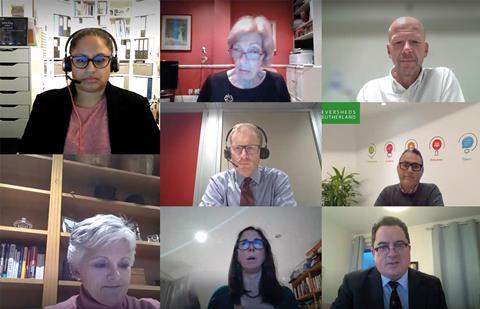
On 23 March 2020 disabled lawyers attained something many had urged on the legal profession for years – working remotely and with greater flexibility was normalised at a stroke. For those disabled lawyers with limited mobility or physical stamina, or who have treatment needs that restrict them in some way, this normalisation was very welcome. It could be seen as levelling a playing field.
But as readers will have noticed from the date, this was not the culmination of a long campaign with which the profession had engaged. The inauspicious context was the first coronavirus pandemic lockdown. The speed at which law firms and in-house legal departments adapted to remote working showed that when called upon to do so, they could change at lightning speed. Could that same apparently easy facility with change be put to use on other measures that would improve the profession’s record on disability?
Language and definition
Several of those attending this discussion are disabled – visible or non-visible – and some have caring responsibilities. They are, though, taking part because they have some responsibility for improving that record. The arena under consideration is larger commercial law firms. Future articles will focus on other parts of the profession – a series has to start somewhere.
The many and various ways the profession has struggled to accommodate disabled solicitors were detailed in the Law Society’s 2020 report Legally Disabled, co-produced by Cardiff Business School, Cardiff University and the Law Society’s Lawyers with Disabilities Division (now the Disabled Solicitors Network). A simple illustration of lagging performance is the gap between the proportion of students at the universities that commercial firms largely recruit from who identify as disabled, and the proportion of recruits who do so. Another is a record on retention, career progression and promotion that is distinctly chequered.
At the outset, the group is keen to set out the language and definitions they feel suit a discussion about disability in the legal profession. Reena Parmar, chair of the Law Society’s Disabled Solicitors Network and a senior knowledge lawyer at Freshfields Bruckhaus Deringer, begins by placing the discussion in the context of the ‘social model’ of disability. ‘The social model,’ she notes, ‘says that people are disabled by barriers in society and by people’s attitudes, and not by their impairment or difference.’
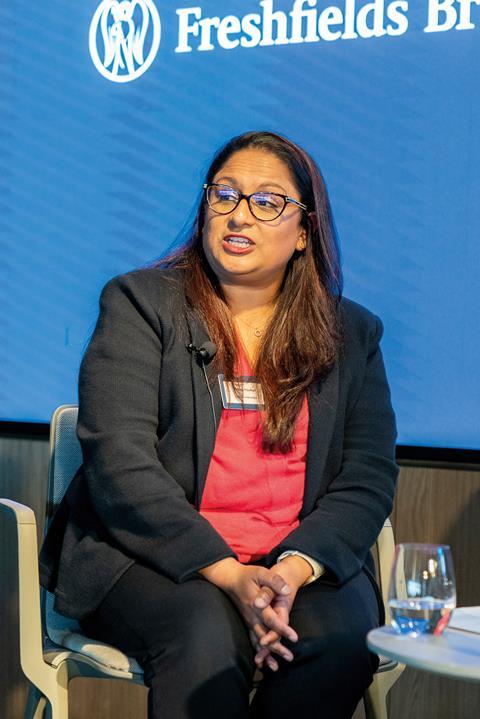
Parmar acknowledges the very broad range of disabilities and conditions the discussion covers. ‘The references I make to disabilities are intended to encompass disability, long-term health conditions and neurodiversity,’ she says, but adds: ‘We should all be mindful of the fact that not all neurodiversities or those with long-term health conditions necessarily self-identify as disabled.’
Turning to the legal profession’s record, she notes: ‘Disability is not a minority issue, yet historically it has not been given the same priority of prominence as other diversity characteristics. The legal profession in particular is behind the curve, I think, in addressing this imbalance. Law firms do need to do more to make the workplace as inclusive of disability as it is of other diversity characteristics.’
Parmar recognises that some progress has been made and has direct experience of an improved approach at some firms, adding: ‘I recognise that there is no quick fix because creating a culture of disability inclusion is complex. It takes sustained time, effort and engagement at all levels within an organisation, from senior leadership downwards.’

Her Freshfields colleague Helen Ouseley, global head of diversity and inclusion, has also worked in financial services. She notes: ‘The fact that this is on the agenda is different than for lots of organisations 10 years ago.
‘There has been change for sure,’ she continues, ‘certainly in the understanding and recognition of the diversity within the disability agenda, and the unique and different experiences that people have.’ Such recognition includes work taking place to understand how people are affected in the workplace when, in addition to their disability, they have other under-represented characteristics.
While recognising such overlaps, Law Society diversity and inclusion adviser Chris Seel says ‘fragmentation’ can sometimes be helpful. That is because the topic has to be ‘manageable’ for people. He suggests the breadth of disability, even within neurodiversity, may explain ‘why it has been neglected – because it’s too difficult, people don’t know what to do. It covers such a range of conditions’. He notes the success of a recent event at Herbert Smith Freehills which focused only on autism.
'There has been change for sure, certainly in the understanding and recognition of the diversity within the disability agenda'
Helen Ouseley, Freshfields Bruckhaus Deringer
‘It’s an incredibly broad church, disability,’ Browne Jacobson partner Mark Blois concurs, adding that a focus on ‘commonality’ is important. ‘There’s a lot of learning to do about different challenges, different conditions and then how you best interact with those to support people, but then to do that on their terms as well,’ he stresses. ‘If disabled people can’t do that… within what you might describe as their own community, then it’s a very steep uphill struggle for everybody else I would suggest.’
Virginia Clegg, senior partner at DAC Beachcroft, questions whether the legal profession has the data it needs to address accommodating disabilities. ‘I am interested in the data and how we gather the data,’ she says. The ability to gather the right data ‘takes us full circle back to people feeling safe in being themselves and acknowledging the support they may wish to have, or the support they may not wish to have’.
This is a point Eversheds Sutherland partner Nick Stubbs links to the language employed: ‘It’s so important that people are using consistent terminology [and] open communication, which then can drive better behaviours and better understanding, and better outcomes.’
Entry level
Can that openness begin during the recruitment process? Herbert Smith Freehills’ head of corporate knowledge, Sarah Hawes, says it can and should. ‘Recruitment is actually the area where we have, quite rightly, focused a lot of time, effort and attention and it reaps some rewards,’ she says. HSF partners with organisations that work with under-represented groups to provide bespoke open days and mentoring. ‘We have seen a definite uptick in the number of individuals not just applying, but applying and disclosing during the application process, and that has been fantastic,’ she says. ‘We then do our best to accommodate any adjustments that are asked for… having that proactive conversation with individuals before they even get in the door.’
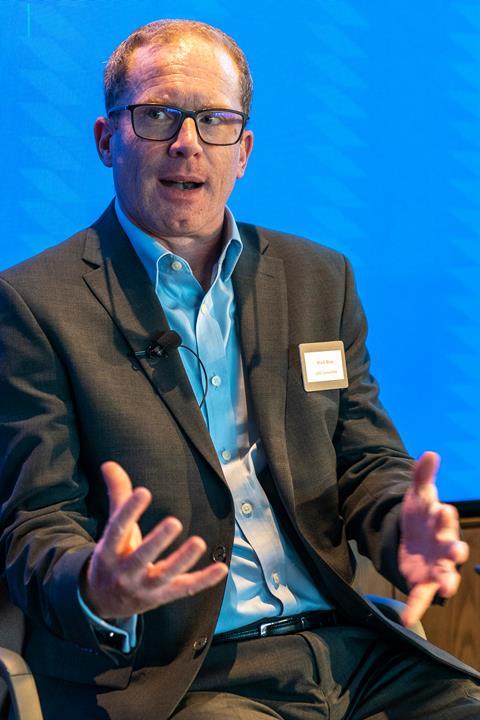
She adds: ‘They’ve normally seen me and others stand up and say, “You would genuinely be welcome here”.’ As a result, Hawes says, applicants ‘feel more able to disclose, and then we can actually have the proactive conversation about adjustments’. That, she explains, is about giving candidates ‘a fair shot’.
Adjustments can extend, Stubbs points out, to the design of a training contract. His firm participates in the Law Society initiative ‘Project Rise’, which is promoting part-time training contracts. These, he says, should help ‘those entering the profession, be that people with disabilities or [those with] other issues around caring… who might benefit from that as a structure’.
Blois also speaks in support of Project Rise, adding: ‘The entry point and then the training contract point is, for me, [a] key litmus test of whether we get it right as a profession or not.’ He says that while ‘people are well motivated to try and support and create a level playing field for people who are either in the profession, or want to be in the profession, who have a disability’, necessary support needs to be built into the profession at a ‘systemic’ level.
‘My worry,’ he continues, ‘is that too much still relies on individual people, individual personalities, individual relationships, and trust that gets built into those relationships.’ Such relationships only begin to be built on when starting a training contract, and through the experience of the ‘seats’ trainees are rotated through. That experience may be mixed, relying on chance for a positive outcome. It is, Blois notes, the ‘luck of the draw’ whether a trainee is supervised by lawyers who are ‘well motivated, committed, wise, sensible’. He wants to ‘bake in to the profession the conditions for everybody to thrive’.
Learning curve: SQE
With the introduction of the Solicitors Qualification Examination came an immediate challenge for some aspiring solicitors – candidates whose disability disadvantaged them when it came to the multiple choice SQE1.
‘The offer was going to be for an amanuensis to read the questions out, and to read the options,’ Chris Seel, diversity and inclusion adviser at the Law Society recalls, ‘which sounds incredibly stressful.’
Many affected candidates wanted the assistive technology they had learned to use for study and work – their preferred way for managing with visual impairment. Exam provider Kaplan and the SRA were initially resistant, insisting an amanuensis was a sufficient and reasonable adaptation.
‘It’s an additional stress added to a life-changing exam,’ Seel says, ‘so we and the Disabled Solicitors Network and other people lobbied to get more assistive technology seen as the norm for the SQE.’
A popular system called Jaws, which assists visual impairment, is now allowed, Seel notes, adding: ‘They’re looking to bring in other assistive technology.’ This will also be considered for all exams, including overseas lawyer qualifications.
‘It’s very early days on the SQE,’ Seel cautions, but adds: ‘That’s a direct success story for the network and for lobbying… thanks to the Gazette as well for publicising it, because it really gathered pace when people saw that that was the option being offered.’
Good management
What about the way law firms work and are managed? Dame Fiona Woolf, ex-president of the Law Society and former Lord Mayor of London, outlines the challenge here: ‘Talent develops and benefits from the supervision of a team leader. The team leaders tend, certainly in the law, not to be really trained in leadership or team management.’
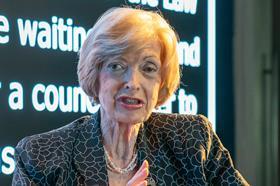
In addition, Woolf says, team leaders are ‘incentivised by chargeable hours targets… income generation targets’. She says: ‘Through no fault of their own, they are very busy people. They are still required to do the work. They’re still required to bring in the business. They haven’t really found a way of doing on-the-job training apart from a conversation in a taxi to a meeting.’
This denotes a setup, a culture and a set of incentives that ‘particularly disadvantage disabled people’, she adds.
Management tools exist to foster change, she notes: ‘There’s been a lot of work done on balanced scorecards… and the non-monetisable value that you can add to your employer is a bit of an art and a science.’
'Talent develops and benefits from the supervision of a team leader. The team leaders tend, certainly in the law, not to be really trained in leadership or team management'
Dame Fiona Woolf
Yet, it is observed, a rainmaker who is poor at management may be tolerated because they are meeting or exceeding their billing targets.
Clegg notes that ‘physical reasonable adjustments’, and the provision of technology, have been more readily embraced in legal environments than other changes. ‘We have a concept called “gliding time”,’ she continues, ‘which enables people to have periods of downtime and to come back up again and be on again’. This is not just a benefit for people with caring responsibilities, she says, ‘but supports people who may, for one reason or another, need to come offline for a period of time to come back on again… it wasn’t devised for this purpose, but it is indirectly supporting colleagues with different needs’.
Taking steps that help, Clegg notes, ‘comes back to that conversation that says, “What are the needs that you have as an individual?” You can’t get into that space unless you can get into the conversation that says what they are’.
Sustaining progress
Commercial law firms, perhaps to their surprise, found themselves busier than ever during the pandemic lockdowns and restrictions, with many posting record results and opting to repay furlough money to the Treasury. But with the UK now in recession, how will remote and flexible working – and commitments to diversity and inclusion – fare?
‘There is a risk of slipping back,’ Clegg warns. ‘I think, if our colleagues start to be fearful for their roles, does presenteeism come back in?’ As a result, she says: ‘We’ve got to redouble our efforts in relation to that and ensure that we hold on to those things which are enablers.’ Without such an effort, she warns, ‘I think we could go backwards’.
‘It’s not a linear, one-way, happy path,’ Ouseley continues. ‘The assumption that we suddenly develop brilliant, inclusive management skills, just because we’re working remotely, is slightly insane… we’ve still got some work to do to upskill and support lawyers to be… people managers in an effective way.’
Blois is also cautious about the sustainability of gains made on working arrangements during the pandemic. ‘I suspect that may come under considerable pressure as a result of the economic situation,’ he says. ‘That would be a horrendous missed opportunity, because there was a huge acceleration that, otherwise, I suspect probably would’ve taken 10, 15 years… I think that is something we need to watch very carefully.’
The challenges law firms face in changing the way they work to enable better inclusion of disabled lawyers are not to be underestimated. Good initiatives are vulnerable to economic pressures. But those present note that there has been a change in awareness and intent.
On intent, Woolf says: ‘I think over the years I’ve been looking at this, [things have] improved enormously.’ She detects ‘much more awareness and buy-in from the senior leadership of firms into the agenda for [equality, diversity and inclusion].’ Nevertheless, she concludes: ‘We have to find a way of running our businesses in a way that is very much more people-focused.’
- The Gazette thanks Chris Seel of the Law Society’s diversity and inclusion team, Disabled Solicitors Network chair Reena Parmar, and Dame Fiona Woolf for their assistance in organising this roundtable. For more information on the Disabled Solicitors Network, contact disabledsolicitors@lawsociety.org.uk.
- The Law Society’s Disabled Solicitors Network is hosting a virtual networking event on Monday 5 December (6-7.15pm) – all welcome. For more information and to book click here.























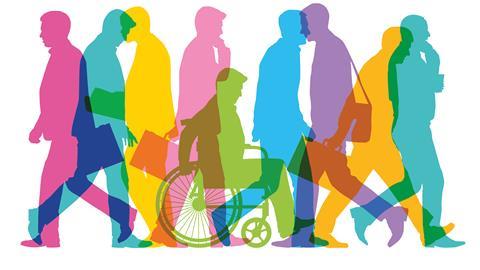








No comments yet